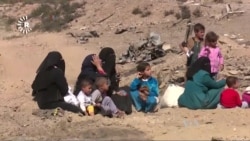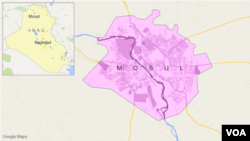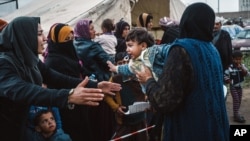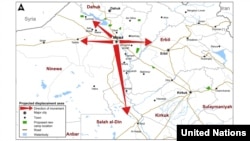Beneath the barrage of weaponry being unleashed on Islamic State forces in Mosul live an estimated one-and-a-half million people, and aid agencies in Iraq are bracing for a humanitarian catastrophe. Up to a million civilians are expected to flee the fighting, adding to the already desperate refugee situation.
An exodus of such proportions would threaten to overwhelm a nation already at the breaking point.
Sarah Case, the director of planning at the International Rescue Committee, who has been working alongside the charity AMAR International in refugee camps, told VOA that the government lacks funds to pay for doctors and nurses.
"Over three million people are internally displaced right now. And in Iraq itself, to date over 10 million people are in need of humanitarian assistance. So it is really a humanitarian catastrophe on a humanitarian catastrophe," Case said.
Refugees have fled towns surrounding Mosul. They describe horrific conditions under Islamic State.
One man said he and his family fled at night and walked for more than six hours. He says they managed to escape the bombs and Islamic State also shot at them. He said people were suffering from starvation and dying in droves.
Around a quarter-million people are expected to flee to Duhok in northern Iraq, which already hosts 25 refugee camps.
Physical, mental health challenges
Duhok’s director of healthcare, Doctor Nezar Ismet Taib, told VOA many of the refugees are likely to be suffering from very poor mental and physical health.
“The first objective is to prevent an outbreak, to prevent infections. And this will be mainly on prevention. They may bring more diseases with them. They may be heavily traumatized, especially the women and the children. So we are expecting a very bad psychological situation for these people,” he said.
Doctor Nezar added the international community must step up to avert a disaster.
“We are out of budget, and we cannot pay salaries, so how can we cope with all this burden that the people came, and the camps, and the war?”
Just escaping Mosul will be the first challenge. The United Nations warns civilians are at extreme risk from crossfire and artillery barrages, as well as snipers.
There are fears Islamic State fighters could use civilians as human shields or stage a chemical weapons attack on those trying to flee.








